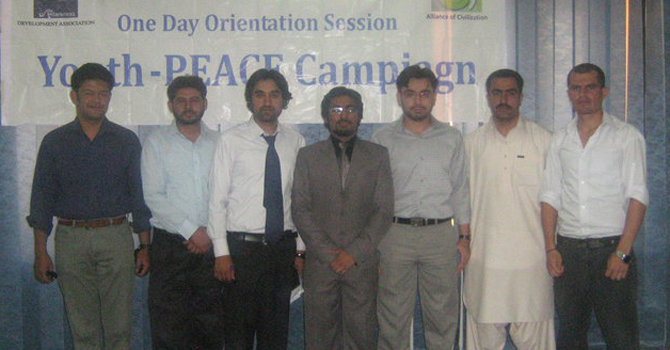
Ali had an intense devotion to education, which is why he was hugely disappointed when he, like many of his fellow citizens, was unable to complete his schooling due to the worsening security situation in Balochistan, particularly his home city – Quetta. His dream of becoming a social psychologist was never realised.
Not one to give up, he found the next best way to quench his thirst for knowledge: engaging with people from various ethnicities and religions. He would try and study every person he met, interacting with them to better understand their lives, their struggles. The honest effort he made in getting to know someone made him approachable and trustworthy.
Ali never remained a mere spectator to what was happening in his country, his province and particularly, his home city where members of his community were being unabatedly slaughtered. His voice rang loud and clear; mobilising the youth, and organising seminars and conferences to address the deteriorating human rights situations in Balochistan.
A peace activist

In early 2011, Ali actively launched the ‘Human Rights Commission for Social Justice and Peace’ organisation. This initiative was essentially aimed at raising awareness about the human rights violations in Balochistan and working towards solutions. Not remaining limited to his own community or province, he traveled across Balochistan and around the country to campaigning relentlessly for education, justice and peace for everyone.
Being a member of the persecuted Hazara community, Ali was very personally feeling the pain inflicted by terrorism, more so than most Pakistanis his age, and because of which he was ever-present, expressing condolences to and solidarity with the victims of terrorist attacks from Karachi to Peshawar to Gilgit and Parachinar.

Dear all join us in candle light vigil, tribute 2 #Bashir #Ahmed#Billour who stood against evil,8 #IslamabadPress Club at 5 Pm today.Ali grew more determined as ethnic and sectarian clashes in Pakistan amplified, preaching tolerance, unity and love to anyone and everyone who would listen.— irfan (@khudiali) December 24, 2012

Ali was of the view that Balochistan’s issues could be solved through dialogue. In his speeches and discussions, he would emphasise that extremism was being purposefully nurtured in the province, urging all ethnic groups of Balochistan to unite and resist it.
#Quetta If #Baloch #Pashtoon & #Hazara want better future for thr children they must collectively get united & counter kidnappers & terristA representative— irfan (@khudiali) November 20, 2012

Representing Balochistan on multiple national forums, he enlightened his audiences about the ground realities in the province which he thought ‘were never portrayed in the mainstream media’. His focus became spreading awareness amongst ordinary Pakistanis about everything that was happening in the province that he believed were kept secret.
A true patriot

Hurt by the anti-Islam movie, Ali entirely disagreed with the way the mob expressed their frustrations by burning up public property, rioting, lynching and threatening religious minorities in the country. He believed that ‘mutual respect, religious harmony, peace and social justice were the only way forward’.

Troubled by the ‘culture of corruption’ in Pakistan, Ali believed it was this very mentality that had paved the way for terrorists and enemies of the country to penetrate into sensitive institutions to cause instability.
A women’s rights activist

It was impossible for a man with a real heart to remain indifferent towards violence against women in Pakistan. And so, he didn’t organise a single event without engaging a notable number of women representatives.

At one such event called the ‘Gender Equality and Sensitization Session with Media’ at Laureds, Quetta, where I too had the honor to speak, I remember being overwhelmed by the sincerity Ali and his co-activists displayed in their efforts to improve women’s livelihood conditions.
A democrat

Whenever asked to suggest the three best solutions to the current crisis in Pakistan, Ali would reply with “Democracy, democracy, democracy!”
“Had Pakistan been ruled by a democratically elected governments from the very beginning, it would have been one of the most prosperous courtiers of the world,” he said during a workshop at Tajai Khan Sports Complex, Quetta in 2011.
A voice for the voiceless
A true, tireless human rights defender, he traveled across the country to raise his voice for the voiceless despite receiving direct and indirect threats.
He once tweeted:
FC role cant be ignored in ongoing #Hazaras genocide in #Quetta becz it doesn't stop suspected person or vehicles enter in city Hazara areasDismissed by the otherwise ultra-active Pakistani media, he never lost hope.— irfan (@khudiali) January 8, 2013

As in the case of most attacks, Ali rushed towards the site of the bomb blast on Alamdar Road, Quetta, on January 10, 2013 to help the victims. He lost his life trying to save another - his death, a symbolic embodiment of his life.
Earlier that day, he had informed me about the letters being thrown into Hazara houses in the Machh and Khuzdar areas of Balochistan threatening them to leave the towns.
His last tweet also read:
#Hazara families of #Machh,Khuzdir finally succumbed to the genocidal pressure&moving out. Sad day for diversity in #Balochistan.Irfan Ali’s body along with 104 other dead bodies are still lying on Alamdar Road, Quetta surrounded by hundreds of thousands of mourners who have rejected to bury their loved ones unless the state of Pakistan promises to fulfill its prime duty — providing protection to its citizens.— irfan (@khudiali) January 10, 2013
For the better part of his life, Ali fought for all Pakistanis, regardless of race and religion. Will Pakistanis now fight for him?
The author is a freelance journalist and human rights activist from Quetta. He can be reached at dr.saleemjavid@gmail.com
The views expressed by this blogger and in the following reader comments do not necessarily reflect the views and policies of the Dawn Media Group.












































